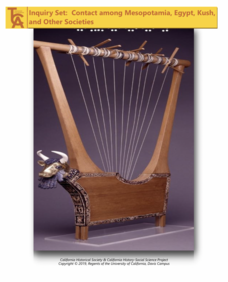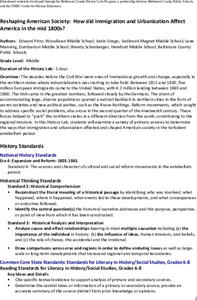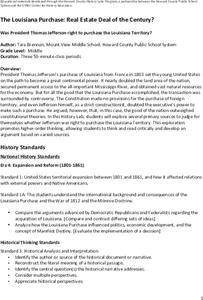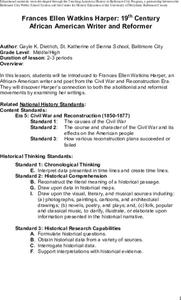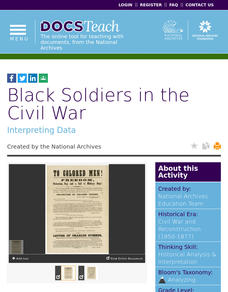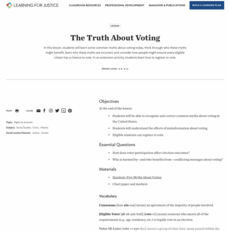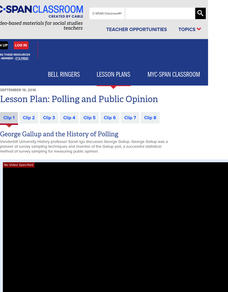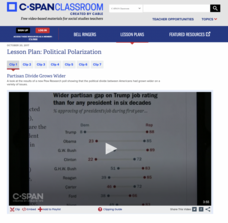University of California
Hellenistic Culture
It doesn't take long to change the world! Alexander the Great's reign may have been short-lived, but his vision for a multi-cultural Hellenistic world shaped Afroeurasia for centuries. Pupils examine documents, such as excerpts from...
University of California
Contact among Mesopotamia, Egypt, Kush, and Other Societies
Trade has always been a global affair. Explore what global trade meant for ancient Mesopotamians, Egyptians, and Kushites using a collection of documents from the historic societies. By examining literary works such as the Epic of...
University of California
Migration of Early Humans: Evidence and Interpretations
While much of prehistory is cloaked in mystery, ancient ancestors left evidence in DNA, languages, and materials from their time. Using photographs of items such as cave paintings and ancient tools, as well as maps of linguistic patterns...
National Park Service
Remembering Pearl Harbor: The USS Arizona Memorial
Young historians use primary source materials to investigate the 1941 attack on Pearl Harbor and the sinking of the USS Arizona. After reading background articles and studying maps and images of the attack, class members consider whether...
Center for History Education
U.S. Foreign Policy and the Iran-Contra Affair: Was Oliver North a Patriot, a Pawn, or an Outlaw?
If you had to write a song about Oliver North, would it be a ballad or a dirge? If you had to put him on a trading card, would he be a hero or the bad guy? Young historians decide for themselves after examining documents from the...
Center for History Education
Guatemalan Coup of 1954: How Did the Cold War Influence American Foreign Policy Decisions?
Was it all about the bananas—or the fear of a communist threat? Young historians use a history lab to examine documents from the American-led 1954 Guatemalan coup. Using graphics, government documents, and speeches, they examine the...
Center for History Education
Reshaping American Society: How did Immigration and Urbanization Affect America in the mid 1800s?
From the Know-Nothings to the Bible Riots, immigration and urbanization changed the face of America in the middle of the 1800s. Using documents that range from immigrant experiences to renderings of violent conflict between immigrants...
Center for History Education
The Louisiana Purchase: Real Estate Deal of the Century?
It's about real estate! Almost overnight, Thomas Jefferson's Louisiana Purchase about doubled the size of the young United States ... but was it constitutional? Using a variety of secondary and primary sources, including Jefferson's own...
Center for History Education
The Federal Theatre Project: Analyzing Conflict Among Relief, Art, and Politics in 1930s America
In the effort to soothe the suffering of the Great Depression, New Deal programs funded a variety of approaches - including a theater project that proved controversial! Using documents such as oral histories, as well as photographs of...
Center for History Education
Maryland During the Secession Crisis
While many think the United States was neatly divided between Northern and Southern states during the Civil War, border states like Maryland are more complicated. Using hands-on activities to measure distance and primary sources,...
Center for History Education
Frances Ellen Watkins Harper: 19th Century African-American Writer and Reformer
Although some African American abolitionists—such as Sojourner Truth and Frederick Douglass—are well known, others, like Frances Ellen Watkins Harper, remain in the shadows of history. Harper was a poet and activist who played an...
Center for History Education
The Star-Spangled Banner: Fact or Fiction?
Is the Star-Spangled Banner an actual account of a gripping battle, or is it just a catchy tune? Young scholars compare eyewitness descriptions of the War of 1812 battle that inspired "The Star-Spangled Banner." They also examine images...
Angel Island Immigration Station Foundation
The Chinese Exclusion Act
As part of a study of Angel Island Immigration Station, young historians examine the Chinese Exclusion Act of 1882, the first restriction on the United States immigration based on race and nationality. They complete a matrix identifying...
Angel Island Immigration Station Foundation
Where Is Angel Island? An Introductory Geography Lesson
Prepare young historians for a study of Angel Island Immigration Station with a lesson plan examining primary and secondary source materials, maps, and websites. Using what they have learned, individuals create a map of Angel Island,...
DocsTeach
Juneteenth General Order
While Juneteenth was more than 150 years ago, today Americans debate whether it should be a national holiday. Using a military declaration proclaiming the last of the enslaved people in Texas free, individuals look at the significance of...
DocsTeach
Comparing Civil War Recruitment Posters
African Americans fought in the Civil War, and they were recruited by both the Union and the Confederacy! By comparing the wording of posters—one directed at freedmen and another to the owners of enslaved people—young historians discover...
DocsTeach
Black Soldiers in the Civil War
Get hands on virtually with recruitment posters for African American soldiers during the Civil War with an interactive online resource. By highlighting key phrases in the posters using an Internet tool, learners discover how African...
Teaching Tolerance
The Truth About Voting
True or False: Only Presidential elections matter. Academics delve into common voting myths to understand what is true and why the election process is critical to democracy. The lesson uses group discussion, activities, and handouts to...
Teaching Tolerance
Social Media for Social Action
Engage in activism, not slacktivism! Scholars discuss social media and the Internet as tools for social change. Next, they engage in a close reading strategy called Thinking Notes as they read an article about social media activism.
National Endowment for the Humanities
“From Time to Time”: Presidents and Communicating with the Public
While the Constitution requires a "State of the Union" address, it doesn't give many details. In fact, it wasn't until Woodrow Wilson that the periodic update to Congress was given in-person. Using primary sources, recordings and...
C-SPAN
Big Data and Politics
Movie selection means more than entertainment. Learners consider what information Netflix gathers to understand the concept of "big data." Resource includes clips of experts talking about corporations that harvest the details of our...
C-SPAN
Survey Analysis- Public Perceptions of Voting and Elections
The perception of fairness in elections becomes more important with each passing election. Using data from a C-SPAN poll, budding historians consider the differences between how people perceive elections. The resource includes videos of...
C-SPAN
Polling and Public Opinion
Polls are ubiquitous in American politics, but just how reliable and equal are they? A video-driven resource helps learners discuss the question by examining what pollsters and pundits say. Extension activities involve evaluating the...
C-SPAN
Political Polarization
Dive into the political breach with pupils and explore the reasons for political polarization. Using clips from C-SPAN that include discussions from reporters and scholars, class members consider what is causing the political fault lines...



